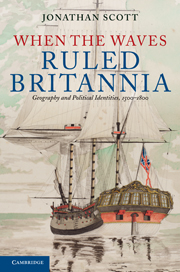Book contents
- Frontmatter
- Contents
- List of figures
- List of maps
- Preface: Geography and the sea
- List of abbreviations
- Introduction: Britain's island idea
- 1 Community of water
- 2 Queen of Sparta
- 3 The discipline of the sea
- 4 Ark of war
- 5 Blowing a dead coal
- 6 The British empire in Europe
- 7 The world in an island
- 8 Anti-continentalism
- 9 What continent?
- Conclusion: floating islands
- Appendix: Duck Language (1724)
- Bibliography
- Index
Introduction: Britain's island idea
Published online by Cambridge University Press: 05 June 2012
- Frontmatter
- Contents
- List of figures
- List of maps
- Preface: Geography and the sea
- List of abbreviations
- Introduction: Britain's island idea
- 1 Community of water
- 2 Queen of Sparta
- 3 The discipline of the sea
- 4 Ark of war
- 5 Blowing a dead coal
- 6 The British empire in Europe
- 7 The world in an island
- 8 Anti-continentalism
- 9 What continent?
- Conclusion: floating islands
- Appendix: Duck Language (1724)
- Bibliography
- Index
Summary
The fact that British influence – measured by the standards … of ancient Greece or China – is a relatively recent … phenomenon only adds to its interest. It is part of … the history of western Europe's Atlantic-side peoples … the land we inhabit is the sump into which Eurasian history has drained … the spread of farming and metallurgy and Indo-European languages; the colonizations of Phoenicians and Greeks … the migrations of Jews in antiquity, and the coming of Christianity … the arrival of oriental mathematics, science and technology; the invasions of Germanic, Slavic and steppeland peoples; Ottoman imperialism … Many of these movements created their refuse … who ended up on the Atlantic shore … unable to get any further west, as if pinioned by the winds. The great problem of their history is not why they took to the sea and spread over the world, but why they took so long about it.
Filipe Fernandez-Armesto, ‘Britain, the Sea, the Empire, the World’Human beings have always exploited water. Intensive agriculture developed on irrigated flood plains; the first complex urban cultures (Sumerian, Egyptian, Indian, Chinese) made use of coastal as well as river and caravan transport. In Song China, as later in the Netherlands and then Britain, commercial societies developed by linking rivers with canals. In the early modern period the whole globe was made one ‘water world’ by the startling accomplishments of long-range Portuguese, Spanish and other European cannon-carrying seafaring.
- Type
- Chapter
- Information
- When the Waves Ruled BritanniaGeography and Political Identities, 1500–1800, pp. 1 - 10Publisher: Cambridge University PressPrint publication year: 2011



